Related Research Articles

The Distinguished Service Cross (DSC) is a third-level military decoration awarded to officers; and, since 1993, ratings and other ranks of the British Armed Forces, Royal Fleet Auxiliary and the British Merchant Navy have been included. Additionally, the award was formerly awarded to members of other Commonwealth countries.

Commander John Wallace Linton, was a Royal Navy submariner and a Welsh recipient of the Victoria Cross, the highest award for gallantry in the face of the enemy that can be awarded to British and Commonwealth forces. Nicknamed "Tubby", he was a fine Rugby football forward, playing for the Royal Navy, United Services, and Hampshire County teams.
Royal Australian Naval Volunteer Reserve (RANVR) was a reserve force of the Royal Australian Navy.
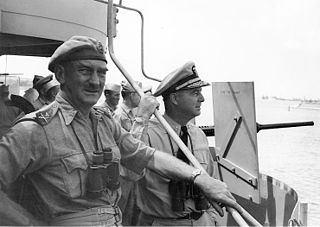
Lieutenant-General Sir John Ledlie Inglis Hawkesworth, was a senior British Army officer who served during both World Wars. During the Second World War he commanded the 4th Division during the Tunisian Campaign in early 1943, later commanding the 46th Division throughout most of the Italian Campaign and, finally, X Corps in Greece, before suffering from a fatal heart attack in June 1945.

Captain James Stuart Launders, (1919–1988), was an officer in the Royal Navy during and after the Second World War. He retired from the service in 1974, but continued to serve in an unofficial capacity on training programs until his death in 1988. In addition to his reputation amongst his crew, colleagues, and historians as a brilliant, highly skilled, and courageous officer, Launders is remembered as the only submarine commander in history to have engaged and sunk an enemy submarine (U-864) using only his own unaided vessel (HMS Venturer) while both boats were fully submerged.
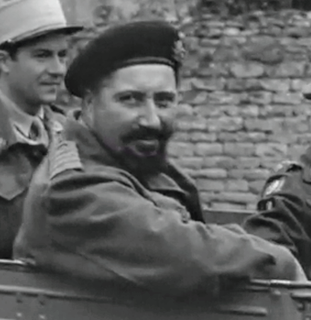
Commodore Colin Douglas Maud, DSO & Bar, DSC & Bar was a Royal Navy officer who during the Second World War commanded the destroyers Somali and Icarus and acted as beach master of Juno beach at the D-day landings. With a heavy black beard, he "possessed the outward appearance of a latter-day buccaneer and was endowed with exceptional boldness and tenacity to go with it". His blackthorn stick and bulldog Winston provided an image when portrayed by Kenneth More in the film The Longest Day. He was described as "one of the most popular officers in the British Navy".
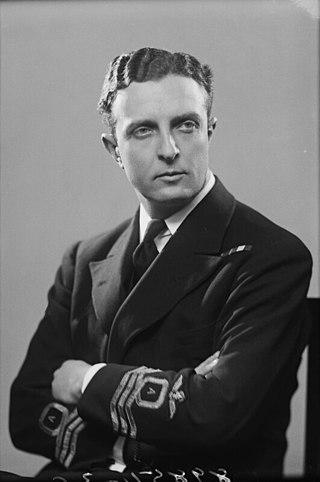
Commander Rupert Arnold Brabner was a British Member of Parliament (MP) who served with the Royal Navy as a pilot in the Second World War and became an ace with 5.5 confirmed kills.
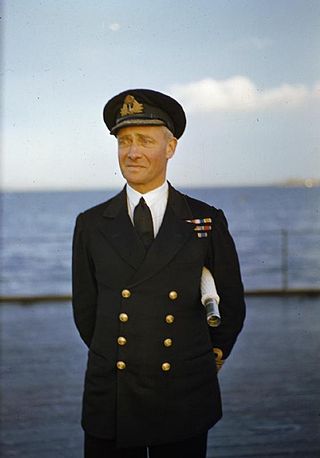
Rear Admiral Philip John Mack DSO* was an officer of the British Royal Navy.

Peter Gerald Charles Dickens DSO, MBE, DSC, RN was a Royal Navy officer during World War II and a great-grandson of novelist Charles Dickens.

Vice Admiral Sir Peter William Gretton was an officer in the Royal Navy. He was active in the Battle of the Atlantic during the Second World War, and was a successful convoy escort commander. He eventually rose to become Fifth Sea Lord and retired as a vice admiral before entering university life as a bursar and academic.
Lieutenant Commander Keith Robin Hoare, was a Royal Navy officer and a recipient of the Albert Medal, a high level decoration of the United Kingdom and Commonwealth awarded for gallantry in saving life. Hoare was awarded the Albert Medal in 1918 for his actions in removing depth charges from HM Motor Launch 356 after its engine room exploded, despite the flames, thus preventing a further explosion. With the establishment of the George Cross in 1940, the Albert Medal was discontinued.
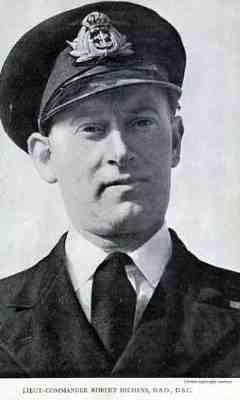
Lieutenant Commander Robert Peverell Hichens, was the most highly decorated officer of the Royal Navy Volunteer Reserve (RNVR), being awarded two Distinguished Service Orders, three Distinguished Service Crosses and three Mentions in Despatches. He was also recommended for a Victoria Cross after being killed in action in April 1943.

Admiral Sir Charles Thomas Mark Pizey was a Royal Navy officer who served as the last Commander-in-Chief and first Chief of Naval Staff of the Indian Navy from 1951 to 1955.
Richard John Cork, was a fighter ace in the Fleet Air Arm of the Royal Navy during the Second World War. Cork served in the Battle of Britain as the wingman for Douglas Bader of No. 242 Squadron RAF. When he returned to the Fleet Air Arm in 1941, Cork served with 880 Naval Air Squadron in the Arctic, Mediterranean and Indian Ocean. It was during Operation Pedestal in 1942 that he became the only Royal Navy pilot to shoot down five aircraft in one day, and was the leading naval ace using the Hawker Hurricane. He was given command of the 15th Naval Fighter Wing aboard HMS Victorious before being killed in a flying accident over Ceylon in 1944.

Rear Admiral Benjamin Bryant, was a Royal Navy officer noted for his submarine exploits during the Second World War. In terms of ships sunk, Bryant was the most successful British submarine commander to survive the war. He was appointed Deputy Chief of Naval Personnel, (Training) from July 1954 to February 1957.
Captain Leslie William Abel Bennington DSO & Bar, DSC & Two Bars was a British Royal Navy officer, who was highly decorated for his actions as a submarine commander during the Second World War.
Captain Howard Francis Bone was a British Royal Navy officer, who was highly decorated during his service as a submarine commander during the Second World War.
Lieutenant-Commander William Bailey, was a Royal Navy Volunteer Reserve officer and businessman, who was twice awarded the George Medal for his work as a clearance diver during the Second World War.
Vice Admiral Sir Maxwell Richmond was a New Zealand-born officer in the Royal Navy.
Commander Norman Eyre Morley, was a British Naval Reserve officer who served in both World Wars, becoming the most decorated reserve officer in the Royal Navy, and the only person to have been awarded the Distinguished Service Cross four times.
References
- 1 2 Allied Warship Commanders - Redvers Michael Prior DSO, DSC, RN, uboat.net
- ↑ "No. 34867". The London Gazette (Supplement). 7 June 1940. p. 3500.
- ↑ Caskie, Donald (2012). The Tartan Pimpernel. Birlinn. ISBN 9780857902047.
- ↑ Lee, David (2017). Beachhead Assault: The Story of the Royal Naval Commandos in World War II. Frontline. ISBN 9781473894310.
- ↑ "No. 35390". The London Gazette (Supplement). 23 March 1943. p. 1370.
- ↑ "No. 36979". The London Gazette (Supplement). 13 May 1945. p. 1382.
- ↑ "No. 36854". The London Gazette (Supplement). 22 December 1944. p. 5879.
- ↑ Hansard, 22 September 1942, col. 288
- ↑ Hansard 1803-2005: Commander Redvers Prior
- ↑ "Prior, Redvers Michael" . Who's Who & Who Was Who . Vol. 1920–2016 (April 2014 online ed.). A & C Black. Retrieved 13 November 2017.(Subscription or UK public library membership required.)